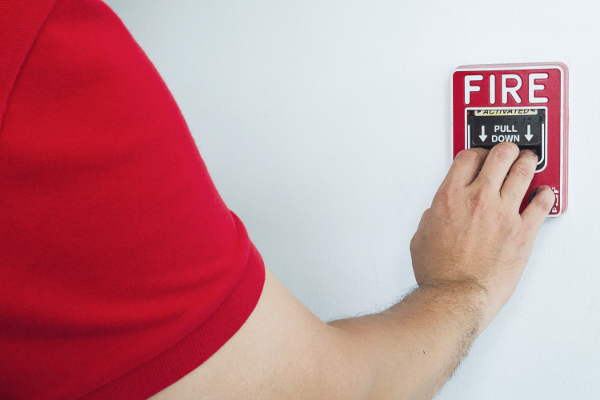
If you want to keep your building safe from the destruction that fire may wreak, you need a fire protection system. The capabilities and dependability of a fire alarm system have greatly improved in recent years.
Concerned about the fire safety of your building?
Fire Serv offers reliable and affordable Emergency Alarm Services to alleviate your worries. Fire Serv is well-known for providing multi-location businesses with expert fire system services. Professional installation, inspection, and maintenance of all types of fire safety equipment, including but not limited to fire alarms, fire extinguishers, emergency, and exit lighting, exit door alarms, panic bars, and more) are available from our trained staff.
Why do we need emergency alarm services?
Protection against fires can save lives and avert disasters. One of the greatest ways to handle the possibility of a fire is to install a top-notch fire protection system. Protecting yourself and your possessions from the devastating effects of a fire requires early identification and warning. Installing the best fire alarm systems that can detect and sound an alarm in the event of a fire is the first line of defense against fire hazards. The following are some of the benefits you may enjoy if you invest in emergency alarm services from a reputable company:
- Help you create a safe environment in your office or home.
- Early fire warning can provide ample time to evacuate the building.
- Help you reduce the loss of your property and even lives.
- Emergency fire alarms can automatically notify the responders during any fire breakout situation for an immediate fire control process.
Types of fire alarms systems–
You can get numerous types of manual and automatic fire alarms at an affordable cost. The information mentioned below helps you decide what type of fire alarm you should install in your home or workplace.
- Conventional Fire Alarms- these fire alarms and their components are wired to the same cable that connects it to the control panel, and it will show a signal once the components activate due to signs of fire. Conventional fire alarms are cost-effective and are better suited for small premises.
- Addressable Fire Alarms- this is a modern system with components that have individual identifiers. Addressable fire alarms are more convenient as they can quickly pinpoint where the fire signal originated and are the best for large companies.
- Hybrid Fire Alarms- these fire alarms are a combination of both conventional and addressable fire alarms. Hybrid fire alarms merge hard-wired and wireless radio technologies under a single control panel.
Do not ignore the Fire Alarm Inspections!
There’s no denying that a properly operating fire alarm is an essential component of any building’s fire protection system, whether it’s a residence or a business. Regular inspections are necessary to ensure the optimal functioning of this system. The trained staff should examine the fire alarm system visually once a week, perform a full inspection once a year, and conduct tests twice a year.
Here some disastrous events may happen if we underestimate the fire alarm system inspection–
- Fire alarms can detect a fire immediately and alert the nearest emergency personnel, but if your fire alarm malfunctions, the delay in this information can hamper the fire control process.
- You may endanger the lives of your near and dears or workers if your fire alarm system fails.
- A false alarm can disrupt your day and unnecessarily send emergency personnel to your location.
Importance of commercial fire alarm inspection–
Prompt alerts from commercial fire alarms can stop a small fire from spreading into a major catastrophe. It is not enough to just install a fire alarm system in a commercial building; frequent inspections of the system are also necessary to prevent fires. It is a significant financial commitment, but life safety systems in a commercial building are essential. Furthermore, knowing your property is secure is much easier when the fire alarm is regularly serviced and operating without hiccups. These preventative checks can save lives and valuables, but they can also reduce the cost of any potential fire insurance claims.
Commercial fire alarms are designed to give prompt alerts to prevent a small fire from turning into a massive blaze. If you have installed a fire alarm system in your commercial building for fire safety, you are also responsible for regularly inspecting it to avoid any unfortunate event. It is a critical life safety measure for your commercial building that can be a large investment. Moreover, having your fire alarm inspected on a regular basis and functioning without interruption will provide you peace of mind that your facilities are safe and secure. These preventative inspections can not only save lives and valuables, but they can also reduce the cost of any potential fire insurance claims.
Looking for reliable fire system services to protect your valuable assets?
With over 20 years in the business, Fire Serv has established a solid reputation as a dependable Fire Alarm System service provider. You can rely on our certified and factory-trained staff to provide the best assistance, top-tier safety gear, and round-the-clock availability. Our job is to provide first-rate support for Fire Alarm System Inspections, installation, and maintenance in accordance with national codes and regulations. So if you’re looking for a reliable service provider, go no farther than Fire Serv. Our senior management is available to assist with your specific needs and will ensure your complete satisfaction with the services provided.
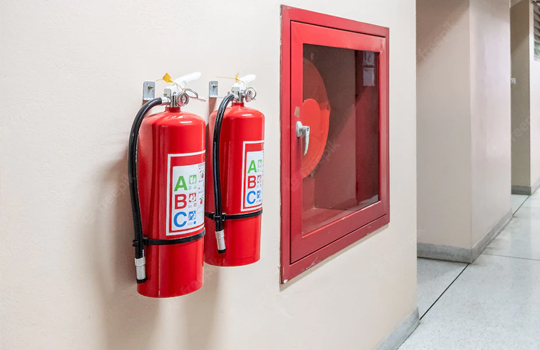
Summers are a time of year when fires occur in commercial buildings more often than during any other season. In fact, according to the National Fire Protection Association (NFPA), summer is the season with the highest incidence of commercial fires.
There are several reasons why summer is a time when commercial fires occur more often. The most common cause of summer fires is grease and oil fires. These fires typically occur in restaurants, grocery stores, and other food-related businesses.
Another common cause of summer commercial fires is cigarettes. Cigarette smoke contains high levels of carbon monoxide, which can easily ignite dried materials such as paper and wood.
Finally, summertime is also the season when electrical equipment is often left unattended in hot weather conditions. This can lead to sparks that start small fires.
What are the Common Causes of Commercial Fires in Summers?
Summertime is synonymous with outdoor activities and the outdoors. However, this also means that it’s a time of year when fires can occur in commercial buildings. Common causes of commercial fires in summers include faulty wiring, overloaded circuits, etc.
Summers can be a time of excess for many businesses. People are outside more, and there is often more opportunity for things to go wrong. Unfortunately, commercial fires in Summers are common, as heat and humidity can create dangerous conditions for equipment and materials. The following are some of the most common causes:
– Electrical fires: These fires are often caused by overloaded circuits or malfunctioning equipment.
- Electrical fires: These fires are often caused by overloaded circuits or malfunctioning equipment.
- Flammable liquids and gases: These can be created by chemicals or by overheating.
- Smoking: This can increase the chances of a fire spreading from one area to another.
- Faulty wiring can be the result of aging or weather conditions, such as humidity or extreme heat, which can cause the insulation to degrade. Overloaded circuits can be the result of using equipment that’s not properly sized for the load or by using too many extension cords.
If you notice any discrepancies in your building’s electrical system, or if any fires seem to be happening more frequently than usual this summer, it’s important to seek out professional help. A qualified electrician can inspect your system for problems and make any necessary repairs.
How to Prevent Commercial Fires in Summers?
To prevent commercial fires from occurring, property owners and managers should take the following precautions:
- Check fire safety codes to ensure the building is up to code. Failing to follow safety codes can lead to dangerous conditions, such as insufficient fire suppression systems or blocked exits.
- Keep all fires in commercial buildings under control using fire extinguishers and alarms. Make sure that staff is well-trained in their use and that alarms are properly installed and operational.
- Inspect wiring for signs of wear and tear, and replace any damaged or faulty wiring as soon as possible. This will help avoid electrical fires.
- Maintain proper cleaning procedures to prevent the buildup of grease, wax, or other materials that can ignite easily. Also, keep floors clean and free of clutter to minimize the potential for tripping hazards.
- Monitor smoking policies in the building to ensure that everyone follows safe practices. If anyone is smoking in a non-smoking area, they should be asked to stop immediately.
Fire Safety Tips every commercial building must follow:
Summertime is the time of year when fires break out in commercial buildings at an alarming rate. Here are some tips to help prevent these fires:
- Make sure your fire alarms are working and test them annually.
- Ensure that all electrical wires and cords are properly tied down or enclosed.
- Make sure doors and windows are properly closed and locked during the day.
- Install or place a fire extinguisher in each room, along with instructions on how to use it.
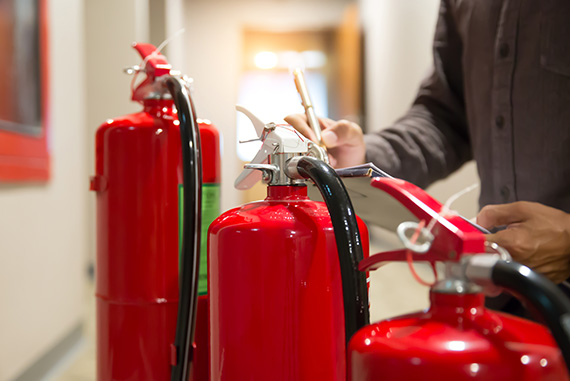
Fire prevention is vital for the safety of life and property, and its importance is the most impactful in two industries – healthcare and commercial kitchens. While restaurant fires are extremely dangerous and spread quickly, healthcare facilities’ fires can be devastating. Therefore, fire prevention in medical facilities like hospitals, clinics, and isolation wards today, are critical life-saving measures.
In planning a fire-safe healthcare facility, the primary safety measure is to put strategic safety exits and fire suppression equipment in place to ensure adequate fire protection protocol is followed. Additionally, mentioned below are some fire safety measures every medical facility must adopt to prevent fires:
Ensure Kitchen Suppression Systems Are Functional.
The NFPA consistently reports the dangers of healthcare fires starting from kitchens. The three pillars of preventing fires starting from kitchens are adequate fire protection equipment installed, trained staff members, and ensuring no gas outlet is left unattended. With FireServ’s fire suppression systems like portable fire extinguishers and automatic fire sprinklers installation services, any fire hazard can be quickly contained before it becomes damaging for the occupants of the facility.
Keep The Fire-Fueling Elements Away.
A medical facility is the perfect breeding ground for a chemical fire. Any smoke or even a tiny spark near flammable chemicals can turn into an uncontrollable disaster. All patients and attendants must be monitored closely so that there is no compromise on the no-smoking rule. This is a necessary precaution to be strictly maintained.
Train Employees For Emergency Situations.
The staff at the healthcare facility bear the responsibility of not only providing medical care to the patients but also assisting in emergency procedures, such as evacuation in the event of a fire. The staff must be trained and mentally prepared to act accordingly in a distress call. Unplanned fire drills, scheduled training workshops, and educating all the healthcare employees on the safety protocol to follow are useful techniques in ensuring that patients are in safe and well-trained hands.
Lastly, maintenance of the fire suppression system with timely inspections and servicing is the final seal of fire-proofing a hospital, lab, or clinic from any potential fire incidents. Contact FireServ professionals to have the fire equipment services completed on schedule with our trained, licensed fire experts and maintenance technicians!
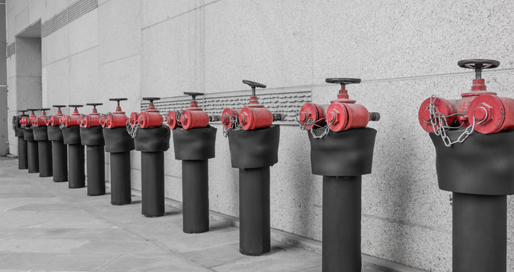
Commercial fire protection is a priority. Many business owners are affected by the potential damage fire can cause. Business owners invest in the best fire protection services to ensure the safety of their employees and business assets. As per the NFPA, fire sprinklers have proven to be the most successful fire safety device.
Unfortunately, in rare occurrences, a fire sprinkler system may fail due to unexpected errors or circumstances. Although the chances of sprinkler system failure are scarce, provided they are well-maintained and regularly inspected by certified professionals. However, if the sprinkler system maintenance has been neglected and the sprinklers haven’t been used for a long time, there is a higher risk that the sprinkler system may not do its job properly.
Here are some reasons for fire sprinkler failure in commercial buildings.
Frozen pipes
It is a problem that usually affects a water-based sprinkler system. The water remaining in the sprinkler pipes may freeze if the temperature falls below a specific temperature. It may cause the pipe to burst and cause water damage. As per NFPA guidelines, the sprinkler piping should be maintained at or above 40°F to protect the valves from freezing.
Corrosion
Corrosion is among the top reasons for sprinkler failure. Due to exposure to various environmental factors over a long period, corrosion may occur in the sprinkler system’s external and internal piping. It may lead to leakages or cause the valve to get stuck. As per NFPA, a sprinkler system must be replaced if signs of corrosion appear during regular inspections as it can deter the sprinkler system’s performance during an emergency.
Inadequate water supply
If the valve has been turned off during routine system maintenance, building construction, or repair of a plumbing leak and a fire occurs in the premises, it may cause sprinkler failure. Although it is unlikely, if the wet fire sprinkler system does not get enough water supply to extinguish the fire, it may result in devastating loss.
Damaged components like sprinkler heads
Sometimes, fire sprinkler systems fail due to a system defect. This may be caused by damage to sprinkler components such as sprinkler head, pipes, or an operational failure during the activation. These types of failures are usually avoided by regular sprinkler inspection, repair, and maintenance by certified professionals. In addition, you may add small protective cages around sprinkler heads to prevent accidental damages.
Lack of Maintenance
Neglecting regular repair and maintenance may cause a fire sprinkler system to fail. Fire safety regulations by local authorities and NFPA require that commercial establishments, depending on the nature of the industry, must have an appropriate sprinkler system installed.
These failures can be prevented with regular maintenance of the system. Routine sprinkler system repairs are crucial to ensure your commercial fire protection system is equipped to handle any emergency. Therefore, it is recommended to get your fire sprinkler inspected every six months or annually by a certified professional, depending on the state fire safety guidelines. If your sprinkler system has not been inspected in more than six months, contact our certified professionals at FireServ to get your system inspected to prevent failure.
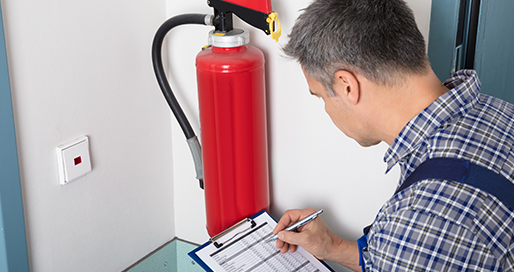
The kitchen is the heart of a commercial restaurant, where all the magic happens. But since it has all the cooking equipment, flammable liquids such as cooking oil, electrical equipment, and cooking stations, it is also the most hazard-prone area for fire-related accidents. As per NFPA, commercial kitchen fires result in over $240 million worth of damages every year. Therefore, it is crucial to understand your fire suppression needs and implement an efficient kitchen fire suppression system.Having a fire suppression system in place is not enough to prevent kitchen fires. The vast majority of business establishments make mistakes that cause fire suppression system failure. If you want to prevent burning down your establishment, here are some things you need to keep in check.
Poor Maintenance
Your restaurant’s fire suppression hood can accumulate grease, oil, and flammable materials, posing a serious fire threat to your restaurant. Despite having a high-quality fire suppression system installed, neglect toward regular maintenance and inspection will result in suppression system failure during fire emergencies. Therefore, your restaurant’s fire suppression system, hoods, and ducts need to be regularly cleaned, inspected, and well-maintained to minimize fire threats.
Poor/wrong Placement of the Ducts
Although kitchen fires are usually caused due to kitchen accidents, the placement of exhaust hoods and ductwork can influence fire behavior. Ducts and exhaust hoods can accumulate grease residue over time which plays a key role in quickly spreading the fire. Also, they control the airflow, which can turn a minor fire into a major disaster. If it is poorly placed, it allows the fire to spread quickly throughout the ducts.
Lack of training in Fire Prevention Measures
Your staff needs to be well-trained in preventing fires and how to react during a fire emergency. They should also know how to manually activate the fire suppression system in case automatic response fails. Lack of understanding of fire hazards and operating a fire suppression system can put your staff and restaurant’s safety at serious risk. The restaurant owner’s responsibility is to ensure the staff is well-versed in recognizing the potential fire threats, safety procedures, and operating the fire suppression system.
Poorly designed and installed suppression system
A well-designed suppression system is critical to keeping everyone safe in case a fire breaks out. A poorly designed or placed fire suppression system with inadequate ventilation presents severe safety risks to your staff and your expensive kitchen equipment. Restaurant owners must ensure the kitchen fire suppression system is appropriately designed and installed according to the kitchen size, placement of heat sources, ventilation, and cooking equipment, in addition to regular inspections and maintenance to ensure its reliability.
Poor layout expansion
If you have extended your business operations and, as a result, want to expand your existing restaurant layout, considerable attention needs to be given to your fire suppression system and the placement of its related elements. Without considering fire suppression system needs, a poor layout expansion can end up in fire suppression failure during a fire emergency. Therefore, it is highly recommended to consult with a fire safety professional when expanding your restaurant.
FireServ has helped many commercial restaurants avoid kitchen fire threats for over 20 years. We specialize in providing fire protection and life safety services, including fire extinguishers, fire alarms, fire suppression systems, sprinkler systems, emergency & exit lighting, panic bars & exit door alarms, in full compliance with national fire protection codes.
Whether you are looking for a technician to maintain your kitchen fire suppression system or need help choosing and installing fire protection devices in your restaurant, our expertly trained team at FireServ will be happy to help you out. We also provide inspections and maintenance services for your fire safety devices to ensure your restaurant is equipped and ready to deal with fire accidents efficiently. Contact our experts for immediate assistance.
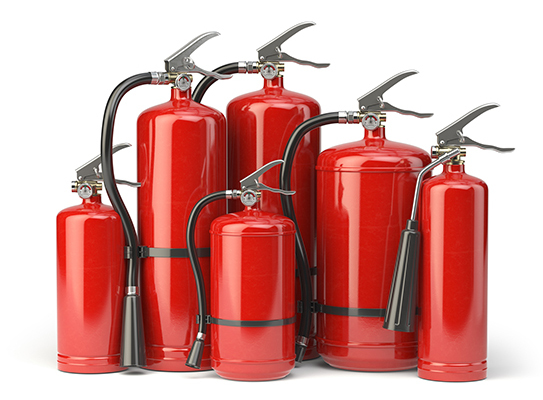
Fire extinguishers are the first line of defense for every residential and commercial establishment against any potential fire hazards. These are the most crucial fire safety devices and are mandatory for every commercial property as per the fire safety regulations. However, one specific kind of fire extinguisher may not be effective against all kinds of fires. Therefore, different kinds of fire extinguishers are designed to put out particular types of fires.
Fire extinguishers are classified into various categories depending on the type of fires they can extinguish. Here are the different types of fire extinguishers and when to use them:
Class ‘A’ Fire Extinguisher
Class A fire extinguishers are used to extinguish Class ‘A’ fires (fires caused by ordinary solid combustibles, such as paper, wood, clothes). To put out a class ‘A’ fire, the heat needs to be extinguished, and the oxygen supply needs to be cut off. Therefore, the class ‘A’ fire extinguishers usually consist of pressurized water. Pressurized water is the most effective way to cool down the fire source. A class ‘A’ fire extinguisher is usually labeled as a triangle with the letter “A” in the middle.
Class ‘B’ Fire Extinguisher
Class ‘B’ fire extinguishers are used to extinguish fires classified as class ‘B’ (fire caused due to flammable and combustible liquids such as alcohol, petroleum, gasoline). To extinguish a Class ‘B’ fire, the oxygen supply must be cut off, and flames must be smothered to stop the fire from burning. As the fire is liquid-based, a Class ‘A’ fire extinguisher will be ineffective. Thus, a class ‘B’ fire extinguisher is used to completely smother the fire with its carbon dioxide (CO2) fire extinguishing agent. A class ‘B’ fire extinguisher sprays cold liquid CO2, dissipating the heat and eliminating its oxygen supply, successfully extinguishing the fire. This type of fire extinguisher is labeled with a square symbol containing the letter “B.”
Class ‘C’ Fire Extinguisher
Class ‘C’ fire extinguishers are used to extinguish class ‘C’ fires (fires caused due to electrical equipment). This type of fire requires electrically non-conductive extinguishing agents to eliminate the fire. For this, a special kind of fire extinguisher classified as class ‘C’ is used. A class ‘C’ fire extinguisher usually contains mono ammonium phosphate and sodium bicarbonate extinguishing agents with non-conductive properties.
Class ‘D’ Fire Extinguisher
Class ‘D’ fires are caused due to combustible metals, such as magnesium, titanium, lithium, etc. These fires usually occur in commercial buildings, manufacturing facilities, or laboratories that deal in the storage or production of flammable metals. These kinds of fires are not easy to extinguish. They require a class ‘D’ fire extinguisher containing powdered graphite, copper-based or granular sodium chloride-based extinguishing agent. A class ‘D’ fire extinguisher can effectively separate the metal from the oxygen supply and resist the burning metals.
Class ‘K’ Fire Extinguisher
Kitchen fires, similar to class ‘B’ fires, are caused due to flammable liquids such as cooking oils, grease, and cooking equipment, but these are relatively high heat fires. These are usually common in commercial kitchens and are capable of spreading rapidly. A class B fire extinguisher can not effectively extinguish these kinds of fires. Thus, a class ‘K’ extinguisher is used to eliminate the class ‘K’ fires in the kitchen. The class K fire extinguisher contains a wet mist of chemical extinguishing agents. It quickly engulfs the fire under a foam blanket and completely cuts off its oxygen supply.
ABC fire extinguisher
An ABC fire extinguisher is a multi-utility fire extinguisher that can extinguish a combination of class A, B, or C fires. These are designed to handle more than one type of fire threat as per your facilities’ unique requirements.
If you would like to know more about portable Fire Extinguishers or need fire extinguisher inspection or maintenance services, you can contact our experts at FireServ. FireServ is the leading provider of reliable fire extinguishers installation, inspections, and maintenance services across northern America. In addition, we specialize in designing commercial fire protection systems that are well-suited to the particular needs of different types of commercial businesses. So, if you need professional fire protection system services, we would love to assist you.
Consult with our experts today!
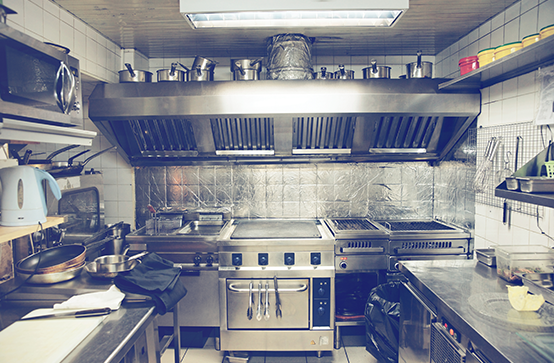
Whether you own a restaurant or a hospital kitchen, you need to ensure that your kitchen is equipped to handle accidental kitchen fires. As a matter of fact, fire accidents are more likely to happen in a restaurant than nearly any other kind of commercial place since there is continuous exposure to high heat in a commercial kitchen.
Kitchen fire accidents have the potential to quickly engulf the kitchen in flames if not handled on time. This is where a kitchen fire suppression system comes in handy. Kitchen fire suppression systems provide a unique way of controlling and suppressing fire hazards.
Following are a few reasons why a fire suppression system is important and necessary for commercial kitchens:
- Kitchen fires can escalate fast and can get out of control in the blink of an eye. The fire caused by the cooking oils and grease buildup is not easy to dispel using any ordinary fire extinguisher. Therefore, a specialized fire suppression system and Class ‘K’ fire extinguishers are needed to prevent the fire from escalating.
- A kitchen fire suppression system is also crucial to ensure personnel safety. The commercial kitchen fire suppression system is usually installed directly above each individual cooking station. It makes it easier to contain the fire in a specified area.
- Moreover, a commercial kitchen is equipped with tools and equipment, which are very expensive and any damages can cause huge losses for the restaurant business. Having a commercial fire suppression system in place can help reduce the risk of property and equipment damages. Fire suppression systems are specially designed to put out fires in commercial kitchens without ruining the food and produce.
A kitchen fire suppression system has various components that you should get yourself familiar with before investing in one.
Components of a commercial fire suppression system
A fire suppression system consists of the following components:
- The fire suppression agent storage cylinder (Carbon dioxide, dry chemicals, wet mist, or sprinkler system)
- Remote/manual activation system
- Supply piping
- Kitchen Hood
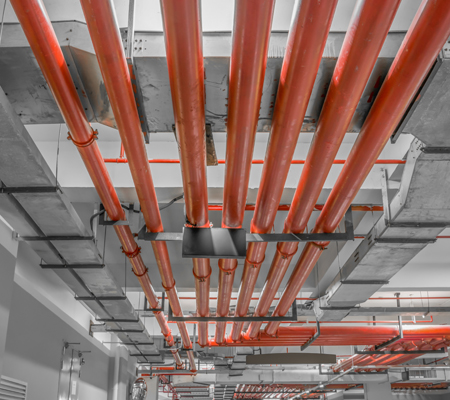
Every commercial building is built differently, so each business’s fire safety requirements are also different. There is no single fire protection system that is sufficient to ensure fire safety. As per different environments and building requirements, there are many different kinds of fire protection systems, a combination of which helps protect your commercial property against fire hazards. Therefore, it is vital to know the various potential fire hazards to choose the right combination of fire protection systems for your building. FireServ has been providing commercial businesses in North America with fire protection systems well-suited to their needs. So if you are in need of professionalfire protection system services, we can help!
Following are the different kinds of fire protection systems required for commercial buildings:
Fire alarms:
Fire alarms are a crucial fire safety device that alerts the building’s occupants in case of a fire emergency. There are many kinds of fire alarm systems featuring pull stations, smoke detectors, strobe lights, sirens, etc.
Emergency exit lighting:
Whenever there is a fire emergency, it is crucial to have an emergency exit lighting system to assist occupants in evacuating the building safely. The emergency exit lighting system needs to be well maintained and functional at all times. Our FireServ professionals will help ensure that your emergency exit systems are operational and up to code.
Fire sprinklers:
FireServ provides fire sprinkler services for businesses nationwide, as well as in Canada and Mexico. Fire sprinkler systems reduce the risk of death and property damage by 87%. These are designed to automatically activate in a fire emergency and offer 24/7 protection to your property.
Portable fire extinguishers:
Fire extinguishers are the first line of defense in a fire emergency. There are many kinds of fire extinguishers, such as ABC dry chemical, wet mist, class K fire extinguishers, and more. It is crucial to choose the right type of fire extinguishers for your commercial building’s protection against fire hazards. FireServ offers quality fire extinguisher services across the United States and ensures these are periodically tested and inspected by our certified fire protection professionals.
Commercial kitchen fire suppression systems:
Commercial kitchens are highly prone to fire hazards. Thus, employing effective kitchen fire suppression systems is the best method to ensure the safety of your employees, customers, and premises. FireServ offers expert installations, inspections, and maintenance of your restaurant’s kitchen fire suppression systems for a safe cooking environment.
Panic Bar & Exit Door Alarm Service
Exit door alarms and panic bars provide easy access to emergency exits during emergencies. FireServ offers installations, repairs, and maintenance for panic bars, exit door alarms, and a broad range of fire safety devices to ensure compliance with local, state, and national fire safety codes.
Implementing the right set of fire safety systems can prevent your commercial building and occupants from fire hazards and minimize property damage. So, if you are unsure about which fire safety systems would be best to protect your business property, get in touch with our certified experts for assistance. We have more than 20 years of experience serving customers across the U.S. with appropriate fire protection system installation, inspections, maintenance, and repairs. Our experts at FireServ are the most knowledgeable in the industry regarding fire protection compliance nationwide.
Need a fire protection system customized to your commercial needs? Our expert professionals will ensure that you are well-prepared to handle any fire emergency. Get in touch with our team to discuss your commercial fire safety requirements.
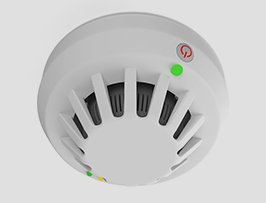
A fire alarm system is a critical fire safety device designed to alert all occupants of a fire threat in a fire emergency. The alarm system’s early warning provides the occupants a chance to evacuate the premises until the firefighters can arrive. As per the National Fire Protection Association (NFPA) guidelines, every commercial property is required to employ a fire alarm system adhering to the fire department’s specific regulations. If you need to install a new fire alarm system or upgrade your building’s existing fire alarm system as per the latest guidelines, it is crucial to learn about the various types of fire alarm systems.
Following are the main categories of fire alarm systems:
Manual and automatic fire alarms
Fire alarms can be broadly divided into two main categories – manual and automatic.
Manual fire alarm system
Manual fire alarms, as the name suggests, need to be activated manually by a building occupant. This type of alarm system is usually connected to a central fire alarm system. Different pull stations are installed everywhere in the building so, whenever there is a fire threat, and any staff member or other occupants notice it, they can pull the lever to sound the fire alarm.
Automatic fire alarm system
An automatic fire alarm system is designed for immediate action whenever it detects heat or smoke in the building. Unlike the manual system, it can protect the building and notify the fire fighting authorities even when there are no occupants in the building, thus saving your building from potential property loss. Whenever the alarm system detects the early indicators of a fire, it immediately sends audio and visual alerts to alert all the occupants.
The fire alarms can further be divided into different types under the above categories, such as:
Conventional Fire alarm system
A conventional fire alarm monitors all the specific parts of a building through a central control board. This system can either be manual or automatic, depending on the commercial building’s size and nature of commercial activities. Whenever an alarm is triggered in any building zone, the alarm activates throughout the building to alert all occupants of the fire threat.
Addressable Fire alarm system
Like a conventional alarm system, an addressable fire alarm system is also connected to a central board. However, each section of the building is assigned a separate fire alarm to notify which area is specifically under the fire threat. The control panel helps in identifying the specific area where the alarm has been triggered. It is usually available in both auto and manual options. Due to its advanced monitoring system, it is also popularly known as an “intelligent system.”
Hybrid fire alarm system
The hybrid fire alarm system is designed to combine the capabilities of both conventional and addressable fire alarm systems. There are many different kinds of wired and wireless hybrid fire alarm systems available.
If you are not sure which fire alarm system is best suitable for your commercial establishment, FireServ can help you manage your fire protection and life safety needs. We offer nationwide fire protection compliance services, including fire extinguishers, fire alarms, fire suppression systems, sprinkler systems, panic bars, exit door alarms, and more.
Get in touch with our team to know more about different fire protection devices and maintenance services we offer.
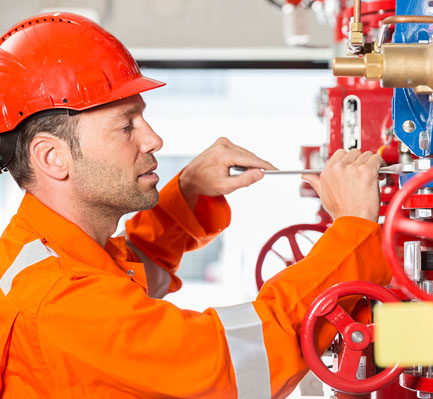
The fire sprinkler system is among the most important components of a fire protection system. It not only protects the occupants against unforeseen fire mishaps, but also prevents major property damage. Thus, maintaining your sprinkler system is crucial for the protection of both property and people, especially during the winter season. As the temperature can drop dangerously low during the winters in many parts of the United States and Canada, your fire sprinkler system’s pipes may freeze. In that case, your fire protection system will become useless in case of a fire emergency. Therefore, it is essential to prepare your fire sprinkler system for winter.
Following are a few preventive maintenance tips for your fire sprinkler system in the winter season:
- One of the causes of water-based fire sprinkler system failure in winter is frozen pipes. When the temperature falls, the pipes’ water may freeze and cause the pipe to burst and cause water damage. Therefore, as per NFPA standards, the water-based fire suppression system, such as the sprinkler system, needs to be maintained at a minimum of 40 degrees.
- It is recommended to monitor the drop in temperature and ensure sufficient insulation to ensure the wet systems are not exposed to freezing temperatures.
- If you are using a wet sprinkler system, it is recommended to mix an antifreeze solution in the water to prevent the water from freezing during cold weather. It is best to consult with a skilled professional to ensure mixing the right concentration of antifreeze solution in water.
- A dry sprinkler system keeps pressurized air in the pipes and can effectively withstand cold weather. However, it is essential to regularly drain the dry pipe system during the winter as it may collect moisture and condensation, which may cause blockages.
- It is recommended to maintain the building’s temperature above 40 to ensure it does not fall below the recommended limit. Having a backup heating system is essential for commercial buildings to ensure the building’s temperature does not drop if there is a power outage.
- It is recommended to add insulation for pipes wherever the pipes exit and re-enter the building or in isolated rooms where there is a lack of heat.
- Without a doubt, the most effective method to ensure the proper functionality of your fire sprinkler system is to schedule regular inspection and maintenance services year-round. It is best to consult with a certified expert from a professional fire protection company like FireServ to ensure proper fire system maintenance throughout the winter season.
FireServ provides professional fire protection services throughout the United States, Canada and Mexico. Contact us today for more information.











